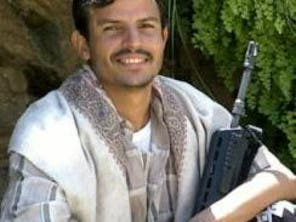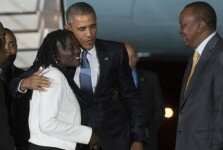
Shiite Houthi rebels hold up their weapons during a rally against air strikes in Sanaa March 26, 2015. (Reuters)
The Iran-backed Houthi rebels seeking to seize Yemen from its fragile internationally-recognized government suffered a blow on Thursday, as three of its top military commanders were reportedly early victims of an aerial offensive by Operation Decisive Storm.
The deadly strikes led by the Royal Saudi Air Force were responding to a plea made Wednesday by beleaguered President Abd-Rabbo Mansour Hadi, who was holed up in the port city of Aden – the government’s last stronghold – as Houthi militias closed in on the city.
The three leaders killed were named as Abdul Khaliq al-Houthi, Yousef al-Madani and Yussef al-Fishi.
The relative
Abdul Khaliq was among the commanders who oversaw the storming of the capital Sanaa, throwing the country into a political crisis, Agence France-Presse reported.
Along with former Yemeni President Ali Abdullah Saleh and fellow Houthi leader Abdullah Yahya Al Hakim, Abdul Khaliq al-Houthi was placed under U.S. sanctions in late 2014 for his alleged involvement in several attacks and attempted attacks on the Yemeni government and foreign diplomatic facilities.
Abdul Khaliq had “engaged in acts that threaten the peace, security, or stability of Yemen,” the U.S. Treasury said in a statement on its website, citing a 2013 attack when he led a group of fighters “dressed in Yemeni military uniforms” in Dimaj in the north of the country. He also ordered his fighters to be prepared to attack diplomatic facilities in Sanaa soon after militants took the capital, the statement added.
The deputy
Yousef al-Madani, a key field commander, had deep bonds with the Houthi brothers.
Married to one of the daughters of Hussein al-Houthi, who was killed in 2004 by Yemeni government forces, he was the brother-in-law of Abdul-Malik al-Houthi, the current Houthi leader. In 2009, he was allegedly wounded by Yemeni government forces, the BBC reported. A year later, Madani was in such a position of trust that Abdul-Malik al-Houthi reportedly handed him temporary leadership of the group after the latter was wounded from a skirmish with government troops.
In 2011, when the Houthi’s began to militarize en-masse and use force, Madani, was in control of the area of Ad Dawar in Yemen’s mountainous north, close to the Saudi border. Madani and around 200 followers began aggressively spreading their brand of Zaidi Shiite Islam, and setting up checkpoints in the area, according to a 2012 report by U.S. think tank Combating Terrorism Center.
The ideologue
Yussef al-Fishi is often seen as a Houthi ideologue, sometimes acts as a spokesman of the group on social media. In January, after the militants forced President Hadi to quit the leadership, described his resignation as good news for all Yemenis and said on Twitter that the Arab country was heading towards “security, stability, tranquility and prosperity.”
Fishi also proposed setting up a presidential council that would include Houthi-led groups, the army and some political parties – a body that the Houthis later set up in 2015. That same month, Fishi was appointed the new head of the committee, after his predecessor failed to convince other factions to join in, London-based Arab daily Asharq al-Awsat reported.








